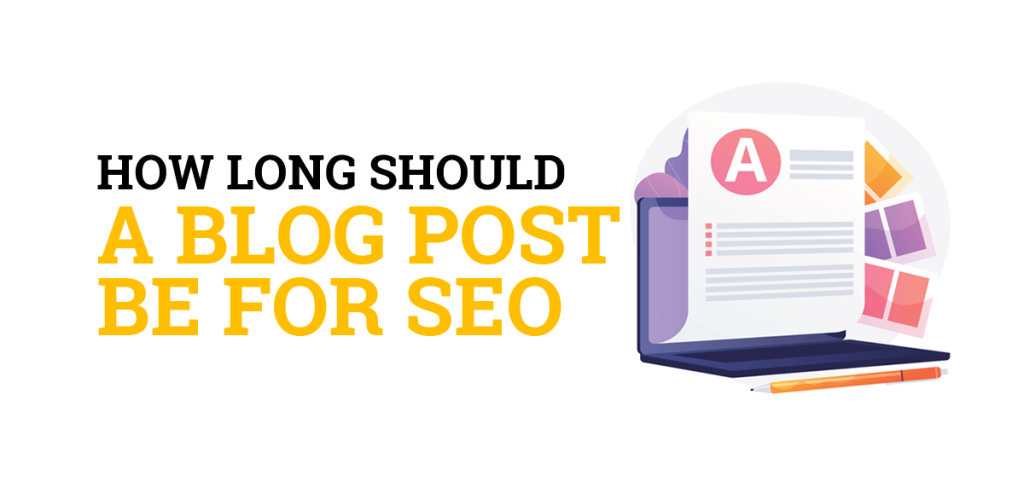In this article, you’ll find out how long should a blog post be for SEO.
As you’ll discover below, the ideal blog post length for SEO falls within a certain range based on industry research and there’s a minimum length you should write for your blog if ranking for organic keywords in Google, Yahoo, and Bing is your top priority.
First, we’ll go over how many words should a blog post be for SEO, then explain if longer or shorter blog posts are better for search engine optimization. Finally, you’ll find out what Google has to say about blog post length and SEO and get a list of best practices to follow for success.

How Long Should a Blog Post Be for SEO?
A blog post should be 2,100-2,400 words long for SEO. Blog posts of this length do better on average for ranking in the search engines for relevant SEO keywords.
This data for how long should a blog post be for SEO comes from a HubSpot study where it measured the average length of the 50 most-read blog posts from organic search engine optimization. According to the research, “Individual blog post lengths ranged from 333 to 5,581 words, with a median length of 2,164 words.” The average word count was 2,330.
Are Longer Blog Posts Better for SEO?
Longer blog posts are better for SEO because long-form content ranks better in organic search than short content. A longer blog post typically has more keywords, entities, substance, evidence, and facts, which are important factors for SEO rankings.
The fact is that longer blog posts have more words for Google’s algorithm to crawl which allows it to index the content for more relevant queries in the search engine. A short blog post, on the other hand, has a limited number of words, which reduces the number of queries it can rank for in the search engine results pages (SERPs).
But not all blog posts need to be 2,100-2,400 words long as mentioned above to rank high in the search engines for relevant SEO keywords. HubSpot also discovered in its study that about one-third of its top blog posts were under 1,500 words. This means that content that’s at least 1,000 words can still rank well in the SERPs for highly relevant keywords.
Additionally, Medium.com conducted its own research and discovered that the ideal blog post length for user satisfaction is a 7-minute read that comes to around 1,600 words. Therefore, a good blog post length for SEO can be anywhere between 1,000 to 2,400 or longer depending on the topic of the content.
Do Short Blog Posts Hurt SEO?
Short blog posts do hurt SEO and longer blog posts rank better in the SERPs. Shorter blog posts can be good for social shares and landing pages but are too short to gain much SEO authority or search traffic from Google, Yahoo, and Bing.
According to a Backlinko study, “The average Google first page result contains 1,447 words.” And another study reports that “Long-form content gets an average of 77.2% more links than short articles.” As you can see, short blog posts can hurt your blog’s SEO rankings from both an on-page SEO and off-page SEO perspective.
What Is the Minimum Length a Blog Post Needs to Be to Be Ranked By Google?
A blog post needs to be at least 300 words to be ranked by Google on the search engine results pages. This minimum length for blog posts ensures that the content can be crawled and indexed for relevant search queries.
However, as you learned throughout this guide, longer blog posts do better with SEO than shorter blog posts. Therefore, you should write content that’s much longer than 300 words if you want to maximize the number of keywords it ranks for in Google’s search engine.
As mentioned in this other article on SEO word count, a good rule of thumb is to have at least 1,000 words for blog posts you want to rank in organic search. Writing 1,500 words would be even better and 2,100-2,400 words is the best for SEO.

What Does Google Say About Blog Post Length and SEO?
In a Google Search Central SEO Office Hours session, John Mueller was asked how many words should a blog post be for SEO and he explained there is no ideal blog post length for SEO per se: “From our point of view the number of words on a page is not a quality factor, not a ranking factor. So just blindly adding more and more text to a page doesn’t make it better.”
Additionally, there’s an entire episode of SEO Mythbusting on YouTube that discusses the topic of 0n-page content, including word count and length. In the episode, Google’s Martin Splitt says that the number of words on a page is not taken into consideration when ranking a blog post in the organic search results.
Those two points are important to understand for SEO because blog post length is not a direct indicator of quality. More words does not necessarily mean better content. What Google cares about most is satisfying user intent and providing search results with demonstrated expertise, trust, and authority (E-A-T).
For example, adding 1,000 words of unrelated, generic, or “fluff” content to make your blog posts longer than the top-ranking competitors will not have any impact on your SEO rankings or website visibility because the additional words are not adding to the E-A-T of the content.
While it’s true that writing longer content makes it easier for Google’s algorithm to figure out what your blog posts are about, the fact is you need to publish comprehensive information that also positions your content as an authority on the topic that enables your web page to rank for long-tail keyword variations in the SERPs. See long tail vs short tail keywords for more details on these types of keywords.
Now that you know how long should a blog be for SEO, let’s move on to some best practices to follow that can help you write better, and longer, content for your blog posts.
Blog Post Length Best Practices
- Do SEO keyword research before writing the blog post so you know which main and secondary keywords should be included on the page.
- Look at the average length of the top 10 blog posts ranking in Google and make sure your content is within that same range.
- Make sure the blog post is long enough so you can include all of the relevant keywords for on-page SEO. See this related article on how many keywords per page for SEO.
- Divide the blog post into sections using proper HTML heading tags such as H2, H3, and H4. Also, include your target keywords in these locations. See this related post on how to put keywords in an article.
- Add images to support important topics in the blog post and to extend the length.
- Use numbered and bulleted lists throughout the post to call out important points and to improve readability.
- Include quotes from other bloggers, books, news articles, experts, and related resources.
- Add relevant questions for the blog post topic by searching on Google and looking at the “People Also Ask” box for good ideas.
- Include a short introduction that explains what the reader will find within the content.
- Include a summary of the key points that were discussed in the blog post.

Ideal Blog Post Length for SEO Summary
I hope you enjoyed this guide answering the question about how long should a blog post be for SEO.
As you discovered, the ideal blog post length for SEO is between 2,100-2,400 words long if you want it to rank for the most organic keywords in search engines like Google. However, not all blogs have to be that long and adding extra words just to meet a specific word count is not the best practice for search engine optimization. Therefore, the answer for how many words should a blog post be for SEO ultimately comes down to satisfying the user search intent and having enough words on the page to answer the search query in an authoritative way. It could be 1,00 words, 1,500 words, or 2,400 words depending on the topic of the content.

SEO Chatter is dedicated to teaching the fundamentals of search engine marketing to help marketers understand how to increase organic website traffic and improve search engine rankings.
